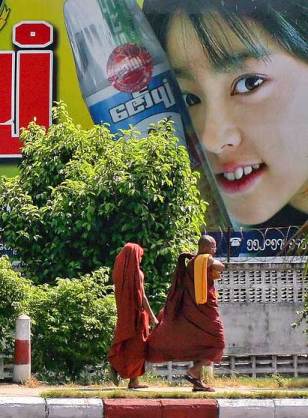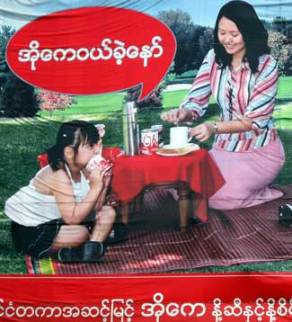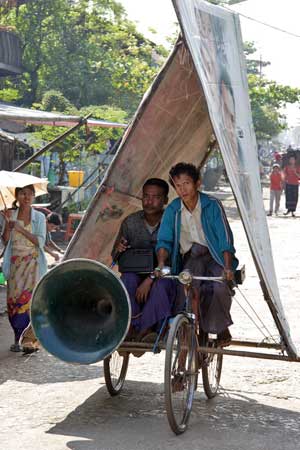Advertisers Target New, Improved Myanmar
By Stephen Brookes • Asia Times • March 23, 1996
________________________________________________________________________________
 They come at you relentlessly, one beautiful, smiling Myanmar woman after another. No sooner has one held up her package of pickled tea leaves than another appears on the screen, hawking makeup or a new music cassette or a local brand of "blood purifier." On and on they come, with shampoos and sunflower seeds and local soft drinks -- a solid twenty minutes of commercials every night on the country's one television channel.
They come at you relentlessly, one beautiful, smiling Myanmar woman after another. No sooner has one held up her package of pickled tea leaves than another appears on the screen, hawking makeup or a new music cassette or a local brand of "blood purifier." On and on they come, with shampoos and sunflower seeds and local soft drinks -- a solid twenty minutes of commercials every night on the country's one television channel.
Welcome to Myanmar's newest craze -- consumerism.
In the past year, advertising has radically changed the once-sleepy face of Yangon. It's not just television that has become clogged with commercials: The main traffic circles are ringed with new, high-quality billboards, the avenues are lined with banners advertising Canon and Daewoo, and the streets are jammed with painted buses touting Red Cow milk and Chungwha Shanghai cigarettes. And the modern, English-language street signs that sprouted across the city a few months ago also double as advertisements for Tiger Beer.
"We're just at the beginning of advertising here," said Michael Lim, director of Myanmar Spa Today Advertising Ltd. "Myanmar is developing into a consumer society. Things are better now than ever. People have more money, and they like to spend it."
Lim's agency, a joint venture with Thailand's Spa, is the latest of several international advertising companies to take advantage of -- and encourage -- Myanmar's consumerist boom. Both the British-owned Bates Advertising and the Singapore joint venture Myanmar Media International Ltd. have had offices in Yangon for two years, and McCann Marketing set up shop in January.
"Myanmar has incredible potential," said Thomas Crawford, Bates' international account director, citing the rapid growth of the economy, the pent-up desire for consumer goods and the influx of foreign companies. "This market is going to be phenomenal."
Bates, the largest buyer of television and cinema advertising in Myanmar, represents a dozen high-profile clients including Lucky Strike, Heineken and J&B Whiskey. And while the market is still small for some of those products, Bates executives say, it's worthwhile getting in early.
"The market here for upscale products is only about 500,000 people -- 800,000, tops," said Peter Thein, a consultant with Bates. "But 110 percent of our clients are optimistic. Eighty to ninety percent of them," he added, "say they would be willing to lose money while building a presence here -- but none of them are losing money."
OK Coffee mix in YangonAdvertisers say the prime market is business people between 25 and 40, and women -- who generally spend more money than men, and are often the breadwinners in Myanmar -- are clearly the target of most the advertising.
Younger people are being watched, as well. "Fifty-four percent of the population is under the age of 25," said Bates' Thein. "If we didn't target them, we'd be stupid."
And while Chivas Regal is advertised in Air Mandalay's in-flight magazine, Myanmar's per capita income still only around US$300 a year, and the primary market is for low-cost items.
"It's a classic pattern," said one executive. "You start with cigarettes, alcohol, toiletries. The property business comes next, and we're starting to see that now. Look at Toyota -- they import only their lower end models, none of the luxury cars."
But tastes are changing, and foreign brands are increasingly in demand as status symbols. Importers of luxury goods privately confirm that some upscale products are priced below cost in order to build a market, and consumers are getting more sophisticated.
"Spending power is higher, and people want new products," said Lim. "In three to five years, they will be buying premium products."
While lauding the market's potential, though, advertising professionals also warn that Myanmar presents unique obstacles. The country endured three decades of a socialist, isolationist regime that left its economy in tatters, and is only now moving toward an open market. Its markets are undeveloped, little is known about what consumers want, and reaching the public is difficult, since the media are largely state-owned -- when they exist at all.
"There are no outlets here!" complained one ad executive in exasperation. "There are only five air-conditioned movie theaters in the entire country. There are few, if any, quality magazines or newspapers, and only one television station. So you have to be creative."
Myanmar's brutal tropical weather -- with a blistering hot season and a drenching monsoon -- also hinders advertising, wreaking havoc on billboards and outdoor displays. Electricity, while improving, is still notoriously unreliable. And while modern, back-lit billboards have started to appear, many advertisers still shun them.
And there are government restrictions on what advertisers can run: no nudity, and nothing offensive to the national religion or culture. Every form of advertising -- even calendars -- has to pass a censorship board.
With few entertainment outlets, Myanmar's sole television channel has, to some degree, a captive audience, and some advertisers think that makes it effective. "The audience here is fresh, very receptive," says Michael Lim. "We don't know exactly how many people watch, but about 70 to 80 percent of households in the cities have televisions." 
Advertising the old-fashined wayNot everyone agrees. "Television is seen all over the world as the best medium, but it's different here," says MMI's Germaine Ng. "There are brownouts, the ownership of televisions is low, and the people who can afford tvs also get satellite dishes."
Moreover, the goverment-set rates for tv advertising give a huge advantage to local companies. A 30-second spot during weeknight prime time will cost a foreign advertiser US$780, but a Myanmar advertiser pays only a fraction of that, encouraging a rash of amateurish, low-budget commercials. And the ads aren't spaced out through an evening's programming; they're run in two separate twenty-minute bursts known in the trade as "walls."
"Frankly, it's a bit of a nuisance," grumbles one advertising executive in Yangon. "It's so cheap to advertise that everybody with a new product tests it out on television. And who wants to watch twenty or thirty commercials in a row?"
The obstacles to traditional "above the line" advertising like tv and billboards have prompted many advertisers to go "below the line," sponsoring rock concerts, sports events, lucky drawings and other promotions. One cigarette maker put cash in some of its packs. Cosmetic-maker Pantene recently sponsored a beauty contest. And all the major ad agencies set up booths during Myanmar's raucous Water Festival in April -- the bigger and more attention-getting, the better.
"We built a humongous stand for Benson and Hedges last year," said Crawford. "Ninety-two feet long, with smoke machines, a rock band -- it was wild."
But ad agencies may face their most crucial challenge in convincing the local business community that it needs them
"They're still at a primitive stage in the way they think about advertising," said Spa's Lim. "They think their products are well-known, so they don't need to advertise."
Germaine Ng of MMI agrees. "The idea of marketing doesn't really exist here; local companies just produce and distribute their products. So we work out a marketing approach for them. But it can take a long time to get them to accept the need for it."
References (18)
-
 Response: http://bit.do/freefacetime
Response: http://bit.do/freefacetime -
 Response: bigg boss 10 winner name leaked
Response: bigg boss 10 winner name leaked -
 Response: November 2016 Printable CalendarVery nice article. I would love to share my blog from where you can get printable calendars for your daily schedules.
Response: November 2016 Printable CalendarVery nice article. I would love to share my blog from where you can get printable calendars for your daily schedules. -
 Response: best eye lashes products
Response: best eye lashes products -
 Response: Buy Sports and Fitness Online
Response: Buy Sports and Fitness Online -
 Response: Online Budget Builder
Response: Online Budget Builder -
 Response: Ac Maintenance Services Sicklerville
Response: Ac Maintenance Services Sicklerville -
 Response: Robotic Process Automation Services
Response: Robotic Process Automation Services -
 Response: The Low Income Network
Response: The Low Income Network -
 Response: Ac Service Near Me
Response: Ac Service Near Me -
 Response: Syair Sdy
Response: Syair Sdy -
 Response: All World Day 2023All World Day is a Blog, where you can read about the all type of events like famous days, Birthdays and more.
Response: All World Day 2023All World Day is a Blog, where you can read about the all type of events like famous days, Birthdays and more. -
 Response: Movies Songs LyricsLyricsMoj.com - We provide latest and accurate Hindi Punjabi songs lyrics of songs from movie and albums. We also have Telugu, Tamil, Kannada, Bhojpuri songs.
Response: Movies Songs LyricsLyricsMoj.com - We provide latest and accurate Hindi Punjabi songs lyrics of songs from movie and albums. We also have Telugu, Tamil, Kannada, Bhojpuri songs. -
 Response: PPM SoftwareCeloxis stands out as a top-tier ppm software, streamlining project management, resource allocation, and portfolio tracking. Its comprehensive features make it a valuable asset for optimizing business processes.
Response: PPM SoftwareCeloxis stands out as a top-tier ppm software, streamlining project management, resource allocation, and portfolio tracking. Its comprehensive features make it a valuable asset for optimizing business processes. -
 Response: Lifeguard recertification
Response: Lifeguard recertification -
 Response: Best federal criminal appeal lawyer
Response: Best federal criminal appeal lawyer -
 Response: Lifeguard certificate
Response: Lifeguard certificate -
 Response: Best test case management toolTuskr is a cloud-based test management tool that helps teams in organizing their test cases and conducting test runs.
Response: Best test case management toolTuskr is a cloud-based test management tool that helps teams in organizing their test cases and conducting test runs.


Reader Comments